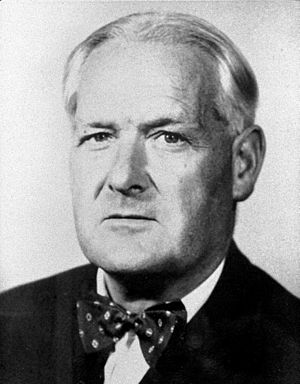Austin Bradford Hill facts for kids
Quick facts for kids
Sir Austin Bradford Hill
|
|
|---|---|
 |
|
| Born | 8 July 1897 Hampstead, London, England
|
| Died | 18 April 1991 (aged 93) Ulverston, Cumbria, England
|
| Nationality | British |
| Occupation | Epidemiologist statistician |
| Known for | "Bradford Hill" criteria |
| Awards | Guy Medal (Gold, 1953) |
Sir Austin Bradford Hill CBE FRS (8 July 1897 – 18 April 1991) was an English epidemiologist and statistician, pioneered the randomised clinical trial and, together with Richard Doll, demonstrated the connection between cigarette smoking and lung cancer. Hill is widely known for pioneering the "Bradford Hill" criteria for determining a causal association.
Contents
Early life
Hill was born in London, son of Sir Leonard Erskine Hill FRS, a distinguished physiologist, and Janet Alexander. He was the grandson of noted scholar George Birkbeck Hill. As a child he lived at the family home, Osborne House, Loughton, Essex; he was educated at Chigwell School, Essex. He served as a pilot in the First World War but was invalided out when he contracted tuberculosis. Two years in hospital and two years of convalescence put a medical qualification out of the question and he took a degree in economics by correspondence at London University.
Career
In 1922, Hill went to work for the Industry Fatigue Research Board. He was associated with the medical statistician Major Greenwood and, to improve his statistical knowledge, Hill attended lectures by Karl Pearson. When Greenwood accepted a chair at the newly formed London School of Hygiene and Tropical Medicine, Hill moved with him, becoming Reader in Epidemiology and Vital Statistics in 1933 and Professor of Medical Statistics in 1947.
Hill had a distinguished career in research and teaching and as author of a very successful textbook, Principles of Medical Statistics, but he is famous for two landmark studies. He was the statistician on the Medical Research Council Streptomycin in Tuberculosis Trials Committee and their study evaluating the use of streptomycin in treating tuberculosis, is generally accepted as the first randomised clinical trial. The use of randomisation in agricultural experiments had been pioneered by Ronald Aylmer Fisher. The second study was rather a series of studies with Richard Doll on smoking and lung cancer. The first paper, published in 1950, was a case-control study comparing lung cancer patients with matched controls. Doll and Hill also started a long-term prospective study of smoking and health. This was an investigation of the smoking habits and health of 40,701 British doctors for several years (British doctors study). Fisher was in profound disagreement with the conclusions and procedures of the smoking/cancer work and from 1957 he criticised the work in the press and in academic publications.
In 1965, built upon the work of Hume and Popper, Hill suggested several aspects of causality in medicine and biology, which have remained in use by epidemiologists to date.
On Hill's death in 1991, Peter Armitage wrote, "to anyone involved in medical statistics, epidemiology or public health, Bradford Hill was quite simply the world's leading medical statistician."
Honours
In 1950–52, Hill was president of the Royal Statistical Society and was awarded its Guy Medal in Gold in 1953.
Hill was made a Fellow of the Royal Society (FRS) in 1954. Fisher was actually one of the proposers.
He was appointed a Commander of the Order of the British Empire (CBE) in the 1951 Birthday Honours and knighted in the 1961 Birthday Honours.
See also
 In Spanish: Austin Bradford Hill para niños
In Spanish: Austin Bradford Hill para niños

